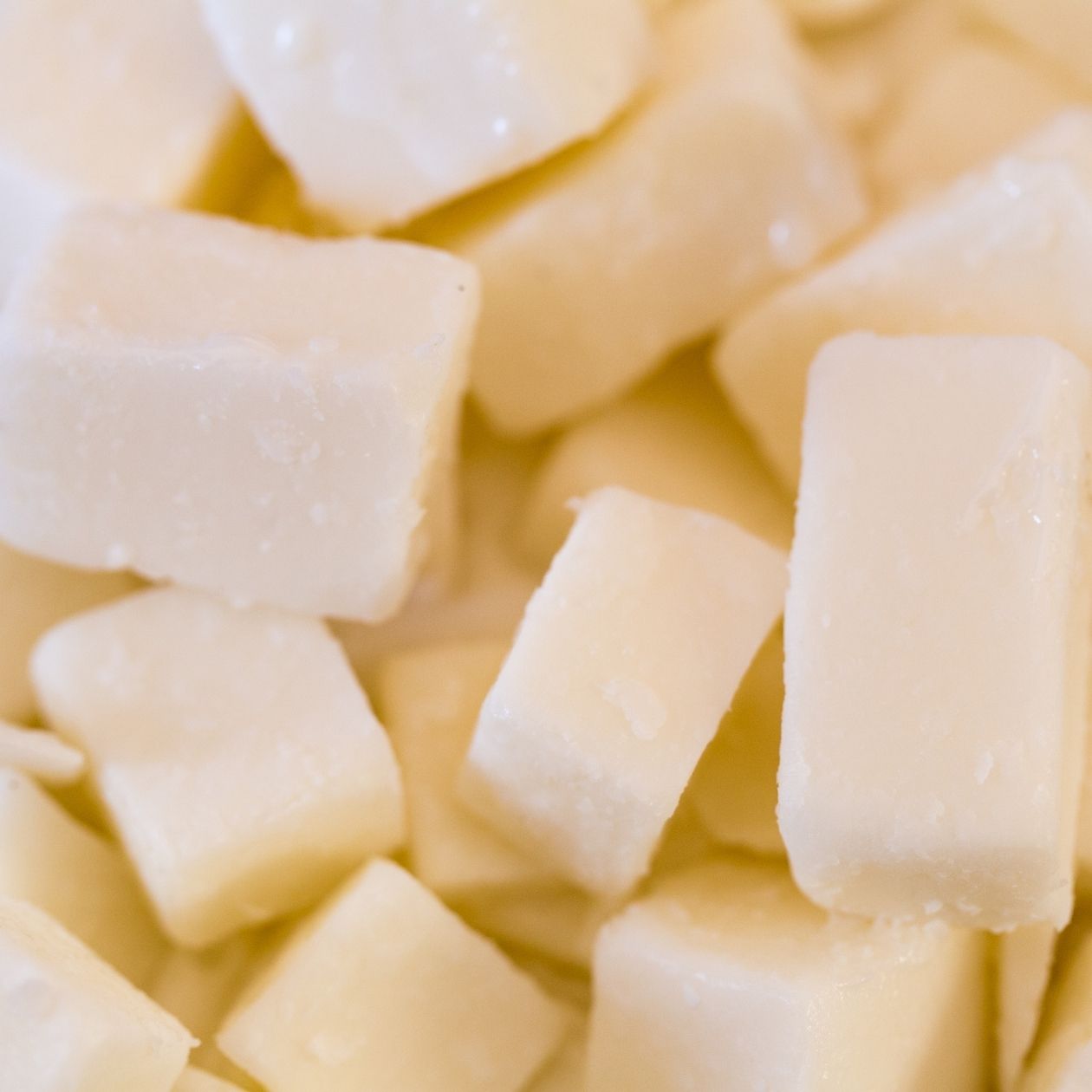
What is Cold-Process Soap? | Natural Soap Making Process

Want to know what makes Mumu Bath soaps unique and extra nourishing? Learn more about the skincare benefits of cold-processed soaps and how we're able to use all-natural, vegan, organic ingredients in every bar:
How is soap made?
In simplest terms, all soap is created through saponification. Electrolyzed salt water is used to create sodium hydroxide lye. The lye mixture is then added to fats and oils to create a salt, which hardens and becomes your soap bar.
*Note: All liquid and hard soap processes require lye.
Before the soap-making process was refined (imagine pioneer times), potash was used to make lye, and some lye often remained in the finished product. On its own, lye is a caustic alkaline (base) chemical, so lye got the reputation for drying out skin.
*If you want to dig deep into the science of it, you can learn more about lye and why it is naturally safe for skincare and consumption (food-grade lye) here.
However, in modern times, no lye is left in the finished product after saponification. In the process, the lye is completely neutralized by healthy fats. Mumu Bath uses plant-based fats to ensure our products are vegan-friendly, organic, and sustainably-sourced.

How is cold-processed soap different from typical commercial bar soaps?
Most commercial soaps use heat to speed up the saponification process. As the lye and fats mix, heat is used to quickly evaporate the water and harden the soap. Heat makes manufacturing much more efficient for mass distribution.
In cold processing, the natural ingredients and essential oils are preserved by allowing the water to evaporate naturally. This process takes more time, but you’ll receive more skin-loving benefits without heat impacting the ingredients.
Using extra fat to neutralize the lye and allowing bars to cure and harden naturally produces mild, nourishing, and moisturizing soaps gentle enough for baby skin.
Cold-processing also allows us to create stunning designs and delicate details on the soap bars. Using heat would distort designs and burn any pretty botanical ingredients. Letting the soap cure naturally lets us infuse beauty and artistry into our bars.

Is cold-processed soap better for skin?
Yes, cold-processed soaps are better for skin because they contain nourishing natural ingredients. The benefits of our plant-based ingredient are preserved by allowing them to cure naturally without heat.
Plus, cold-processed soaps made with healthy fats are ultra-hydrating. You’ll get rich, creamy lather that puts moisture back into your skin instead of stripping your skin and drying it out with synthetic ingredients. Cold-processed soap protects your skin and allows it to retain its healthy natural oils.

How are you able to make vegan soap bars and skincare products?
At Mumu Bath, we use fats and oils from organically-grown plants. Our bars are made with a variety of fats and oils. There’s a bar for everyone in case you have an allergy or sensitivity to a certain oil. You can find all of the ingredients in the soap description. Our organic, vegan, and sustainable fat sources include:
- Jojoba oil
- Cocoa butter
- Coconut oil
- Rice bran oil
- Shea butter
- Olive oil
- Palm oil
- Avocado oil
- Sweet almond oil
*Our palm oil is sustainable and ethically sourced in South America from Palm Done Right with RSPO certification to minimize our environmental impact.
**No Sodium Hydroxide is left in the finished product.

Do you have a hypoallergenic bar?
We know that just because essential oils and botanicals are natural doesn’t mean everyone can use them. We also offer a hypoallergenic Pure soap bar with no essential oils or botanicals added. It lathers into rich, tight bubbles, which make it perfect for facial cleansing and shaving. It’s great for little ones with super sensitive skin, too!

What is Castile soap?
Castile soap is simply soap made with oliveoil and other vegetable oils instead of animal fats. The nourishing blend originated in the 1800s historic region of Castile, Spain, hence the name.
Most castile soaps are bit more on the alkaline side for cutting through grease and grime. Mumu Bath soaps are not considered castile soaps because all of the sodium hydroxide has been neutralized in our products to prevent drying out skin.
However, our bars have homespun castile vibes in the sense that we use clean, natural plant-based oils and ingredients. They’re just gentler than some castile soaps.
Try these beautifully crafted and delightfully scented (and unscented!) plant-based bars with olive oil:
- Unscented Pure Soap
- Kiss Me Sunshine
- Orange Eucalyptus Bar
- Mint Marble Bar
- All-in-One Body & Shampoo Bar
- Rose Pink Clay Soap
- French Clay Facial (most like traditional castile soap)
- Tea Tree Charcoal Soap
- Signature Hydrating Facial Bar
Have more questions about our cold-processed soap bars?
We’re happy to answer any questions you have and help you pick the best product for your skin! Let us know if you have specific skin conditions or sensitivities, and we can guide you in the right direction. If you’re local, we’d love to meet you inside our New York shop or at a local market. Find our location, hours, and contact info here.
Explore all Mumu Bath Natural Skincare products here.

